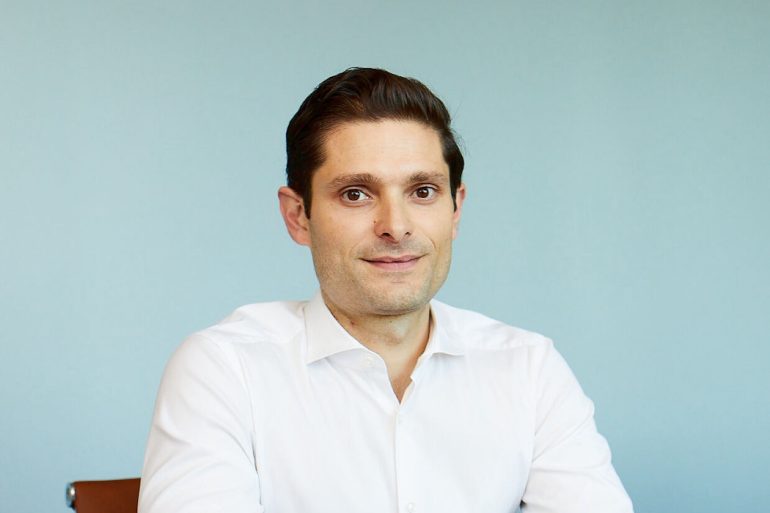After riding last year’s crypto lending boom while avoiding some of the pitfalls that befell its competitors, Ledn co-founder and chief strategy officer (CSO) Mauricio Di Bartolomeo believes the firm is ready to navigate the current ‘crypto winter.’
Over the past year and a half, the Toronto-based crypto lending startup has grown from about 10 to 110 employees, and closed a total of nearly $130 million CAD across a trio of funding rounds, including seed, Series A, and Series B financing. As cryptocurrency asset prices rose and demand for crypto lending soared, Ledn grew the amount of assets on its platform from around $150 million to a high of $1.7 billion in 2021.
“It’s to protect people from the next Luna. It’s protecting them from the next Quadriga … If they had Proof-of-Reserves, this would have come out—you know, it wouldn’t have allowed the Ponzi to get so big.”
The crypto market has since cratered, asset prices have nosedived, and over $2 trillion USD in value has been wiped out, leaving many retail investors in the lurch. Amid these conditions, many crypto lenders in particular, from Voyager Digital to Celsius, Genesis, BlockFi, and Vauld, have reportedly faced solvency issues or filed for bankruptcy—moves experts have forecast could lead to regulatory backlash.
While Ledn has certainly felt the impact of the crypto crash, Di Bartolomeo claims the startup is in “a very different position” compared to many of its peers. “What’s become evident after all that’s happened is that not all [crypto] lending platforms are created equal,” Di Bartolomeo told BetaKit in an interview.
“When times are good, you don’t ask the right questions,” said Di Bartolomeo. “And when times get bad, it’s unfortunately too late to ask the right questions.”
According to Di Bartolomeo, Ledn has always taken a more measured and “conservative” approach to spending capital, risk management, and crypto lending than some of its competitors. “We didn’t do a Super Bowl ad, we didn’t do any of these wild things,” he said.
Founded in 2018 by Di Bartolomeo and CEO Adam Reeds, Ledn offers Bitcoin and USDC savings accounts and Bitcoin-backed loans to clients in over 100 countries (USDC is a digital stablecoin pegged to the US dollar). Backed by a list of investors that includes Coinbase Ventures, Susquehanna Private Equity Investments, Valor Capital Group, and White Star Capital, the startup enables users to borrow funds at 7.9 percent annual interest and earn yields of up to 7.5 percent annually by lending out their Bitcoin and USDC stablecoins.
Some clients—including many in Canada and the US—turn to Ledn as a place to store and earn interest on their Bitcoin and USDC, while others, including fellow financial institutions, use the company’s platform to access cash loans to buy more Bitcoin or cover traditional expenses. According to Di Bartolomeo, about 50 percent of Ledn’s loan originations go to Latin America, which he says makes sense given that the region has “inferior banking infrastructure.”
Unlike some other crypto lending platforms, Ledn does not use decentralized finance (DeFi) protocols to generate interest on any of its client assets. “If you think back to Terra and Luna, that burned a few of the big guys, and it kind of trickled from there,” said Di Bartolomeo.
Ledn is also relatively limited in terms of the assets it supports, focusing only on Bitcoin and USDC, which the CSO called “the two most liquid markets.” Other crypto lending platforms like Celsius supported a wider variety of assets—some of which had “no institutional demand”—which Di Bartolomeo said helped lead to asset-liability mismatch and liquidity issues.
For Ledn, transparency is also key—especially in today’s uncertain crypto market. The startup claims it was the first crypto lender to provide Proof-of-Reserves attestations, a process Ledn undergoes every six months whereby an independent public accountant reviews the startup’s client asset balances, lending, and custodial balances to ensure the firm is properly accounting for client assets. Ledn published its fourth Proof-of-Reserves attestation in mid-July after moving up the date by a month in light of the current market.
“In a company like Celsius, nobody knows what they were doing with the money that they got,” University of Calgary associate professor and FinTech and crypto expert Alfred Lehar told BetaKit in an interview.
RELATED: Ledn raises $70 million in Series B funding, plans launch of Bitcoin-backed mortgages
Lehar described disclosure as “an important step forward” in the crypto lending market, and characterized Ledn’s approach to transparency as “very encouraging.”
“I think you will see more companies in the future that are in this space doing more disclosure, because the good companies will want to set themselves apart from the bad companies,” said Lehar.
Ledn’s lending risk analysis and due diligence process involve examining the financial statements of prospective borrowers, interviewing their management teams, and testing or fact-checking their investment strategies in-house.
When it collapsed earlier this summer, Three Arrows Capital (3AC) triggered a broader downward spiral that impacted other crypto lenders like Genesis, but not Ledn, says Di Bartolomeo. “They came to us and we never set up a relationship with them because we couldn’t get comfortable,” he said.
RELATED: Coinsquare lays off 24 percent of staff amid turbulent crypto market, shifted focus to regulation
How Canadian securities regulators ultimately plan to police the complex world of crypto lending remains unclear, but Ledn has been working with the Ontario Securities Commission (OSC) for some time now. Di Bartolomeo said the firm continues to have a “constructive dialogue” with the OSC.
For his part, Di Bartolomeo hopes to see more crypto lending regulations emerge from the current crisis. As for what that regulation might look like, the CSO believes it should involve more transparency, such as Proof-of-Reserves attestations. “A big piece of it is disclosure … and giving investors the right information so they can make the right decisions,” he said.
“It’s to protect people from the next Luna,” said Di Bartolomeo. “It’s protecting them from the next Quadriga. “It’s not that far from home … not many years ago, we had Quadriga. If they had Proof-of-Reserves, this would have come out—you know, it wouldn’t have allowed the Ponzi to get so big.”
According to Di Bartolomeo, some crypto lending services were luring clients with above-market rates while also misrepresenting themselves as adequate risk managers. Meanwhile, the CSO said that others made false claims about their insurance, stating that their accounts were FDIC-insured. “That should not be allowed,” he said.
“Everything was a bit of a black box six months ago,” said Di Bartolomeo.
Moreover, said Di Bartolomeo, many crypto lending platforms did not disclose how they generate interest, the amount of risk they were taking on, which counterparties they were working with, or which jurisdiction they were registered in. “There was just a lot of basic information that wasn’t being shared,” he added.
Satraj Bambra, managing partner of Round13’s Digital Asset Fund—which recently secured an initial $70 million USD—told BetaKit that this lack of transparency in the space has kept the Toronto-based firm from investing in crypto lenders altogether.
“I think that’s part of the problem with what happened,” said Bambra.
Given Ledn’s approach, Di Bartolomeo claims that the startup took zero loan losses and has no need to seek emergency financing—instead, like fellow Canadian crypto firms WonderFi and CoinSmart, Ledn is actively exploring merger and acquisition (M&A) opportunities. The startup was previously part of a group that sought to invest in embattled crypto lender BlockFi.
While the BlockFi deal did not pan out—as BlockFi ultimately agreed to be acquired by FTX instead—Di Bartolomeo expects other opportunities to arise given the drop in crypto valuations and more adverse startup fundraising environment. He noted that Ledn has examined firms from the crypto lending, broader crypto, and traditional finance spaces.
The CSO says these conditions could lend Ledn the chance to purchase “a great product, team, [or] some licensing” at a more affordable price. At the same time, Di Bartolomeo noted that the startup is “very cognizant” of any brand or liquidity issues potential acquisition targets might be facing.
The crypto crisis has undoubtedly hurt and scared many investors away. Di Bartolomeo believes two looming factors will help draw them back.
“The two big drivers for me for bringing people back or engaging people again are going to be necessity—the Latin America story … [and] regulation in the more investor-type markets, because once they start seeing the [United States] eagle stamped on things, or the [Canadian] maple leaf, that [will] give people a lot of comfort,” he said Di Bartolomeo.
During this period, Di Bartolomeo expects to see a “renaissance” in the value of stablecoins.
Despite current conditions, Ledn and Di Bartolomeo remain bullish on Bitcoin, and confident that its price will rise again over time. At the same time, he said that it would be “crazy” to see that happen right now in an environment “where most central banks are just on a crusade to bring down asset prices” by raising interest rates to combat inflation.
During this period, Di Bartolomeo expects to see a “renaissance” in the value of stablecoins. “Stablecoins are going to be the only format of dollars available to a large part of the world,” he said. “The market capitalization of stablecoins is likely going to double from here until the end of the year.”
Given this, he anticipates strong demand for USDC as a store of value from emerging markets like Di Bartolomeo’s native Argentina, Chile, and Colombia, as the buying power of local currencies falls and social unrest mounts. “That’s going to be a big tailwind to the business,” the CSO added.
“The whole crisis will in some ways be good because it will eliminate some of the bad players from the market, and so the ones that survive this are stronger and better companies,” said Lehar.
Ledn hopes to be one of the survivors. “We believe that this industry is going to flourish,” said Di Bartolomeo. “Right now, we see this as a big opportunity to come out on the other end … a much stronger player, I would argue, by a product of what’s happened to the competitive landscape.”
Feature image of Mauricio Di Bartolomeo, courtesy Ledn.



